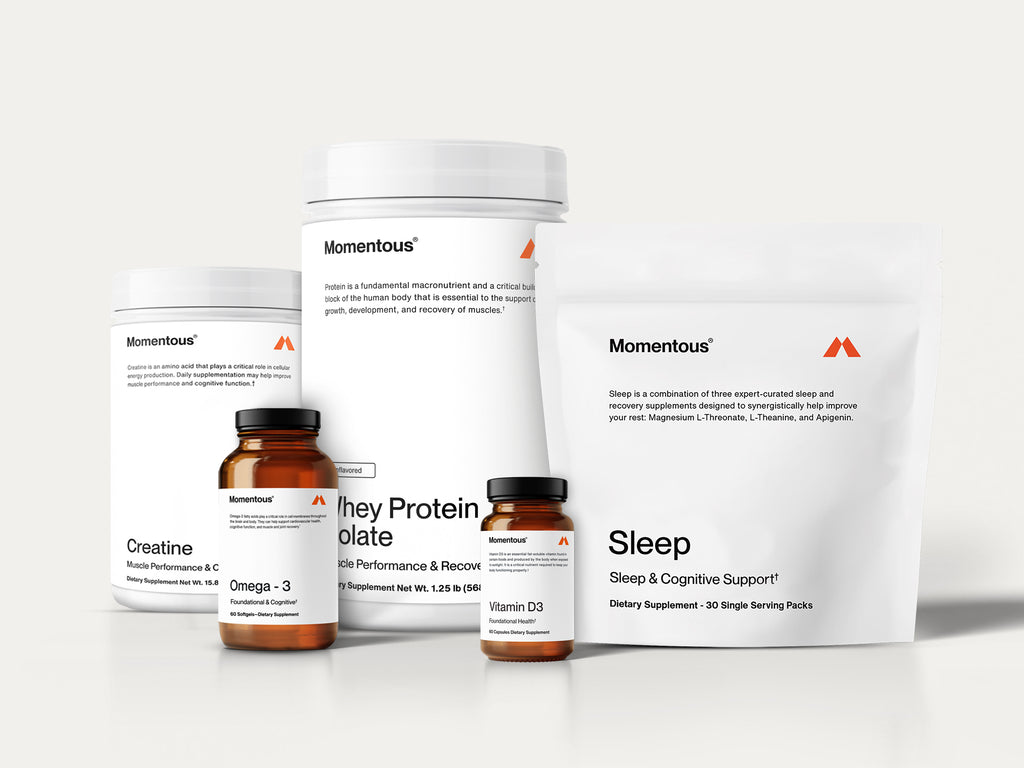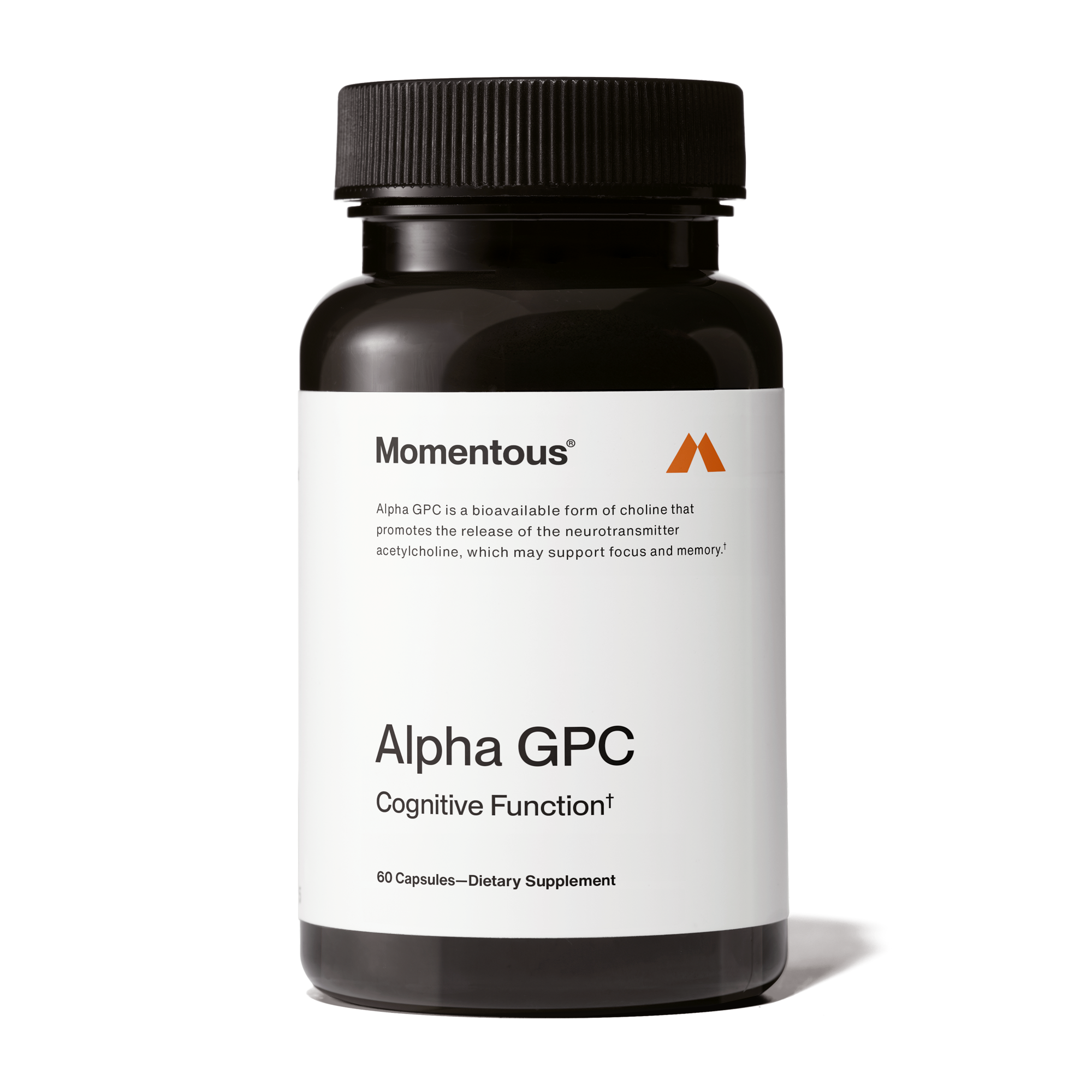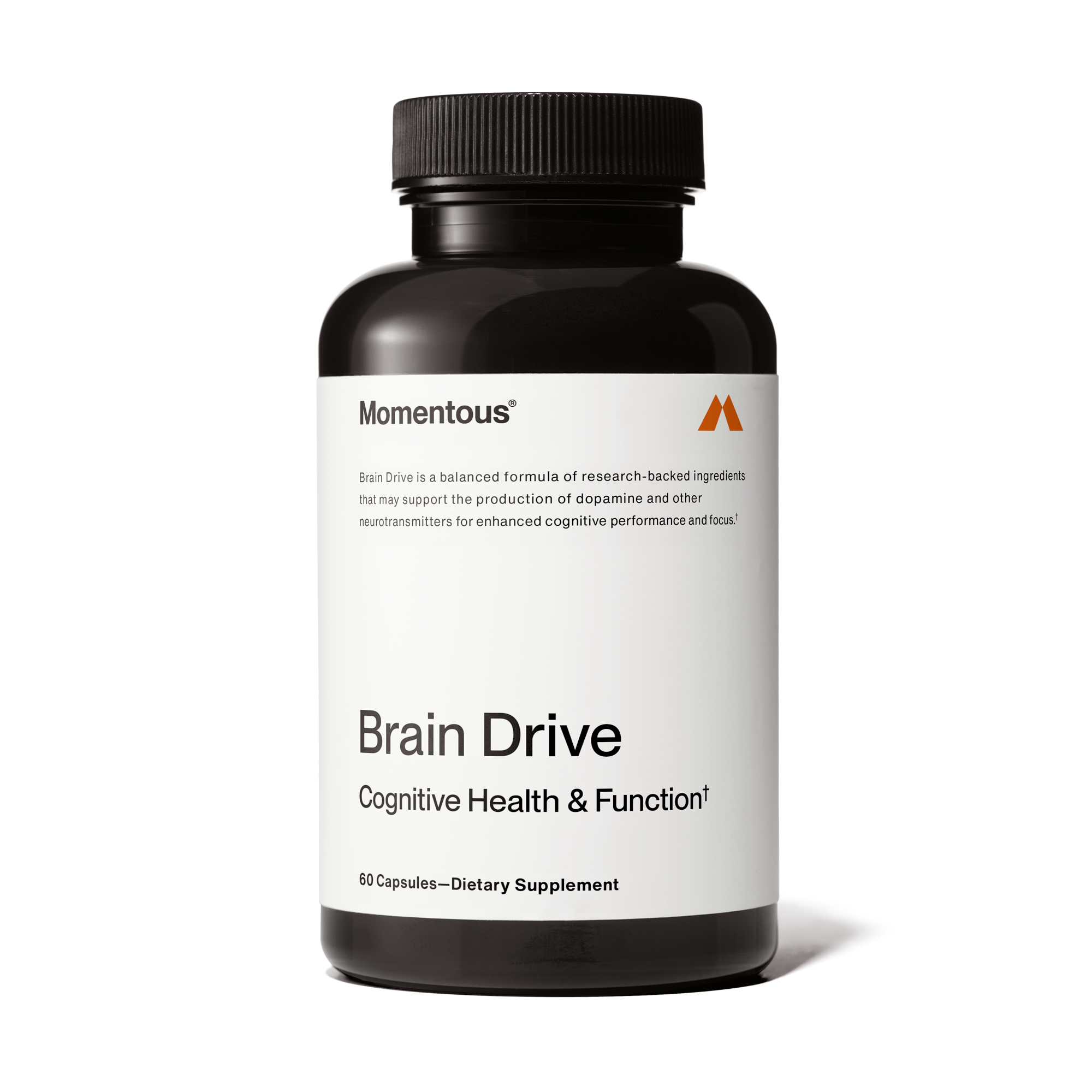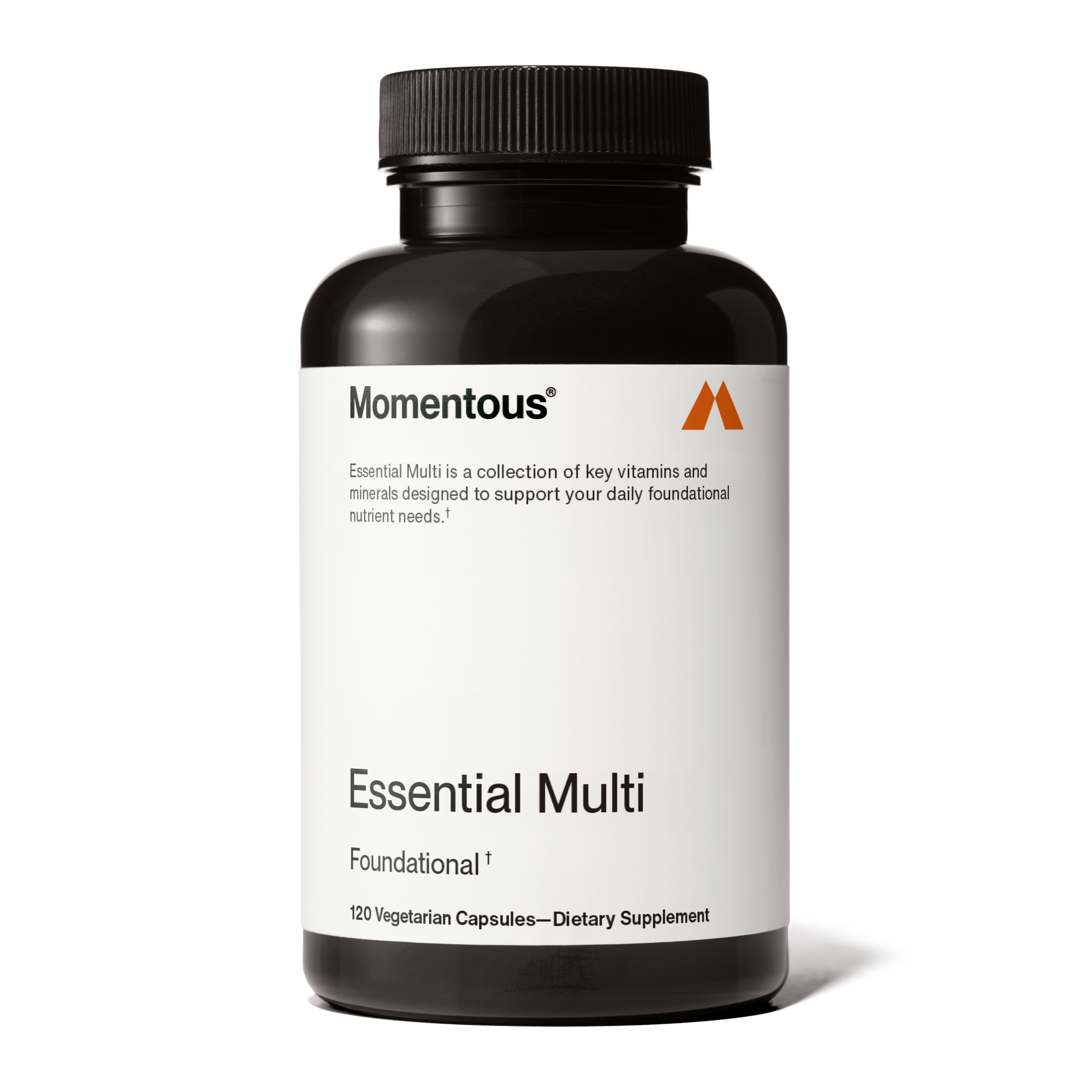Choline source that supports memory, focus + brain health
Daily nootropic blend for clarity, productivity + cognitive function
Whole-food–based formula to fill nutrient gaps for daily health
In the morning, your alarm or your kids might be what wakes you up, in the sense that they stop you sleeping. But from a biological perspective, it’s actually your brain chemicals that prompt you to get up, propel you into your morning routine, and help you achieve everything you do throughout the day. In this article, we’ll take aim at two neurotransmitters – dopamine and acetylcholine – unpack what they do, and share what you can do to prompt their production so you’re more motivated, focused, and dialed in.
What are Neurotransmitters?
First, let’s look at what brain chemicals are and the role they play in your body. Neurotransmitters are chemical messengers stored in the billions of neurons in your brain. When they're released, neurotransmitters enable a nerve cell to send a message to another nerve cell, a gland cell, or a muscle cell by bridging the gap between them that’s called a synapse. Neurotransmitters help regulate virtually every process in your body, from breathing to immune function to circulation, to name just three.
What are Acetylcholine and Dopamine and How do They Function in the Body and Brain?
Acetylcholine and dopamine are two of your main brain chemicals. Acetylcholine was actually the first neurotransmitter to be discovered, back in 1914. It has an excitatory effect at the neuromuscular junction in skeletal muscle, prompting muscular contraction. Beyond its functions in your body’s musculoskeletal, autonomic nervous, and cardiovascular systems, acetylcholine also plays an important part in cognition, impacting how well you reason, concentrate, and learn. Acetylcholine-producing cells are found in multiple regions of your midbrain and brainstems, including the nucleus basalis, substantia innominata, and septum. When it’s released from these areas, acetylcholine has an excitatory effect, elevating your arousal level, improving attention, and increasing your ability to learn and recall information.
Dopamine is another potent neurotransmitter. It’s part of the family that also contains epinephrine (adrenaline) and norepinephrine (noradrenaline), two other brain chemicals that play an important role in the sympathetic (fight or flight) nervous system. Dopamine-producing cells are found in the midbrain regions. When it’s secreted, dopamine has an excitatory effect. In the substantia nigra part of your brain, it helps regulate your emotions, movement, and cognition. In the ventral tegmental region, dopamine is key to predicting rewards and learning how to obtain them. It not only governs your response to success (which is how it became known as a “feel-good” neurotransmitter) but is also involved in the drive and motivation needed to pursue rewards.
People who suffer from Parkinson’s disease don’t produce enough dopamine, while those struggling with Alzheimer’s have chronically low acetylcholine levels. Such depletion manifests itself in lack of motor control, memory loss, and confusion. Even those who don’t have chronically depleted levels of these neurotransmitters can experience brain fog, a lack of focus, and trouble learning and recalling information and motor patterns.
How Can I Boost Dopamine and Acetylcholine with Supplementation?
To some degree, your brain will release certain amounts of acetylcholine and dopamine no matter what, because they’re essential to physical and cognitive function. Though your nerve cells will always secrete these neurotransmitters, you can set the stage for them to be produced at a more optimal level. The easiest way to accomplish this is to dial in the food you eat and the supplements you take in the morning.
When formulating Momentous Brain Drive, we sought out ingredients that would work together to support cognitive function. The first is citicoline, a form of choline that a Nutrients paper concluded can cross the blood brain barrier to boost neurotransmitter production.[1] A second key ingredient, acetyl-L-carnitine, is an amino acid that not only prompts the release of acetylcholine and dopamine but also promotes the growth of myelin, which is essential for learning and memory formation, per research published in Neuroscience Letters.[2]
Another amino acid, tyrosine, increases the secretion of dopamine, epinephrine, and norepinephrine, stabilizes mood, and, according to a study published in Military Medicine, might help your brain ward off the effects of stress and adrenal fatigue.[3] We also included precise amounts of vitamins B3, B6, B9, and B12, which play a crucial role in brain function and nervous system health. Finally, we added bacopa monnieri, an herb that neuropharmacology researchers found improves blood flow to the brain, prevents the build-up of harmful proteins and oxidants, and improves the utilization of acetylcholine.[4] Together, these ingredients prime your brain to function at its best so you can start each day ready to concentrate, learn, and find a flow state.
How Can I Fuel My Brain with Food?
In addition to supplementing daily with a product like Momentous Brain Drive, dialing in the macronutrient profile of your breakfast can also make your morning more focused and productive by increasing the release of dopamine, acetylcholine, and other neurotransmitters. As we wrote in our recent post on morning routine, what you eat first thing has a significant impact on how you function for the rest of the day. A study conducted by nutritional scientists at the University of Missouri compared eating a high protein-breakfast (35 grams) with one lower in protein (13 grams). The lead author told The Wall Street Journal that the high-protein option not only helped participants control food cravings later in the day but also led to “a 15-fold increase in dopamine.”[5]
A high-fat breakfast can have a positive impact on your neurotransmitter levels too. According to a report commissioned by the Committee on Military Nutrition Research, eating foods rich in choline “can lead to severalfold elevations in plasma choline levels, thereby increasing brain choline levels.”[6] While fish, poultry, and organ meats are all rich sources of choline, the most convenient breakfast option is eggs, which will also pack a sufficient protein punch to elevate dopamine levels. Or, if you’re pursuing a plant-based diet, try whole-grain bread slathered in choline-rich peanut butter.
Whether you’re trying to crush a morning training session, nail a big work presentation, or help your middle schooler with their math homework, you’ll need to be focused, driven, and alert. There are many ways to set yourself up for success, but to begin with, try feeding your brain the fuel it needs to shift into high gear.
Resources:
[1] Kamil Synoradzki and Paweł Grieb, “Citicoline: A Superior Form of Choline?” Nutrients, July 2019, available online at https://www.ncbi.nlm.nih.gov/pmc/articles/PMC6683073/.
[2] N Fukushima et al, “Acetyl-l-Carnitine Enhances Myelination of Regenerated Fibers of the Lateral Olfactory Tract,” Neuroscience Letters, 2017, available online at https://www.sciencedirect.com/science/article/abs/pii/S0304394017304810.
[3] S Attipoe et al, “Tyrosine for Mitigating Stress and Enhancing Performance in Healthy Adult Humans, a Rapid Evidence Assessment of the Literature,” Military Medicine, 2015, available online at https://pubmed.ncbi.nlm.nih.gov/26126245/.
[4] Sebastian Aguiar and Thomas Borowski, “Neuropharmacological Review of the Nootropic Herb Bacopa Monnieri,” Rejuvenation Research, August 2013, available online at https://pubmed.ncbi.nlm.nih.gov/23772955/.
[5] Daniel Akst, “Rise, Shine and Eat Protein,” The Wall Street Journal, October 31, 2014, available online at https://www.wsj.com/articles/eat-breakfast-and-remember-the-protein-scientists-say-1414764968.
[6] Richard J.Wurtman, ”Effects of Nutrients on Neurotransmitter Release,” Food Components to Enhance Performance: An Evaluation of Potential Performance-Enhancing Food Components for Operational Rations, 1994, available online at https://www.ncbi.nlm.nih.gov/books/NBK209058/.
















